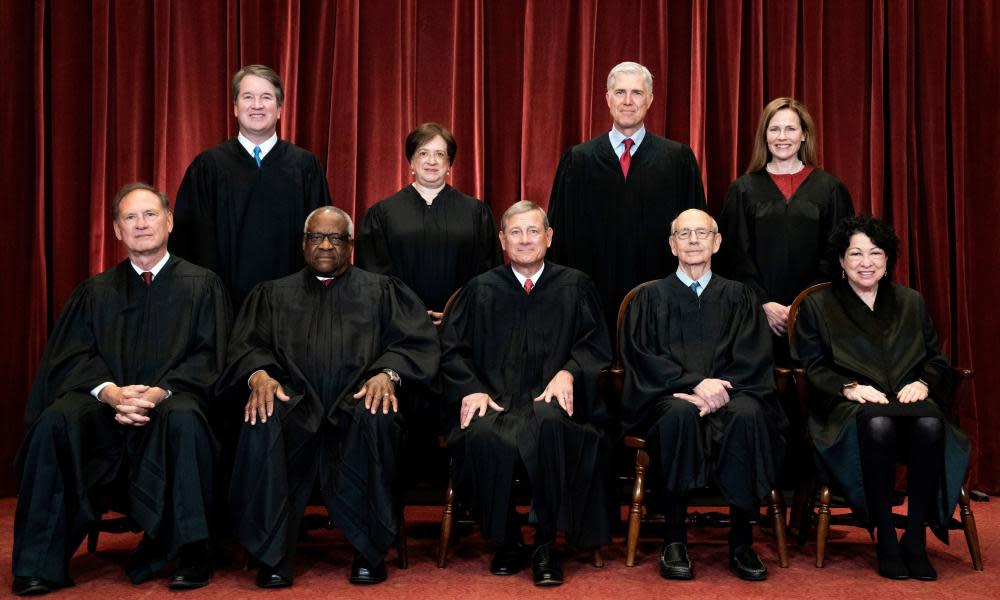To protect the supreme court’s legitimacy, a conservative justice should step down

- Oops!Something went wrong.Please try again later.
- Oops!Something went wrong.Please try again later.
- Oops!Something went wrong.Please try again later.
In Planned Parenthood v Casey, a landmark decision from 1992, the US supreme court memorably noted that its “power lies … in its legitimacy”. If the people come to question the court’s legitimacy, they will cease to accept the “the Judiciary as fit to determine what the Nation’s law means and to declare what it demands”.
It appears that Justices Clarence Thomas and Amy Coney Barrett share these worries. In separate remarks this month, both justices sought to assure the public that, in Coney Barrett’s words, “this court is not comprised of a bunch of partisan hacks”. Thomas said much the same, seeking to disabuse his listeners of the belief that justices “are just always going right to [their] personal preference”.
Triggering the justices’ concerns was the withering criticism that has been directed at the court’s recent decision to leave in place, at least for now, a Texas law that turns ordinary citizens into de facto bounty hunters empowered to sue anyone who performs or “aids and abets” an abortion for a woman past her sixth week of pregnancy. The Texas law cannot be squared with the court’s ruling in Planned Parenthood, which recognized that a “woman’s right to terminate her pregnancy before viability … is a rule of law and a component of liberty we cannot renounce”. To renounce that principle, the court warned, would cause “profound and unnecessary damage to the Court’s legitimacy, and to the Nation’s commitment to the rule of law”. But that is precisely what the court did in letting Texas’s transparently unconstitutional law take legal effect.
But far from recognizing or examining their own role in contributing to the erosion of the court’s legitimacy, the two justices turned to other precincts to assign blame. It’s the media, Thomas whined, that are “destroying our institutions” – this from a justice who dissented from the court’s refusal to hear Trump’s challenge to a Pennsylvania state court decision that extended the deadline for the receipt of mail-in ballots by three days. Thomas acknowledged that the volume of mail-ins at stake had no material bearing on the outcome of the Pennsylvania race; all the same, he was prepared – in a stunning display of either partisanship or tone-deafness – to have the supreme court, scant weeks after the 6 January insurrection, offer tacit support to Trump’s attack on the 2020 election results. And, in now blaming the media for the court’s self-inflicted wounds, Thomas is effectively echoing Trump’s toxic rhetoric about “fake news”. Who is the institution-destroyer here?
Alas, Justice Coney Barrett joined Thomas in attacking the press. The media, she charged, makes decisions such as the Texas case “seem results-oriented”. It is worth noting that the justice made her remarks at the McConnell Center at the University of Louisville, with Senator Mitch McConnell, the center’s namesake, in attendance. It was McConnell, of course, who in the wake of Ruth Bader Ginsburg’s death six weeks before the 2020 election, pushed through Coney Barrett’s nomination, in transparent violation of the very justification he had offered four years earlier to deny President Obama the right to name a justice to fill a court vacancy that ultimately went to Neil Gorsuch. That McConnell’s cynical manipulation of the rules was designed to compose a court that would produce dependably conservative results appears lost on Coney Barrett. Indeed, it was her vote that was determinative in the Texas case. Had Ginsburg still been on the court, the decision would have gone 5-4 the other way. McConnell secured the results he wanted.
If Coney Barrett were genuinely concerned with promoting the court’s legitimacy, she might consider resigning. Or rather, she and Gorsuch might agree to flip a coin to decide who should leave the court. If presidents do not get to replace justices in an election year, then Coney Barrett’s confirmation is illegitimate; and if presidents do get to replace, then Gorsuch’s confirmation must be illegitimate. You can’t have it both ways – not if you believe that the composition of the court should be the product of a principled process.
Coney Barrett appears to willfully overlook the fact that she has been elevated to a rarefied position through a tarnished process that will taint all decisions in which her vote plays a crucial role. And just as we might hope that a person who, through no fault of their own, has come into possession of a good not rightfully theirs, would return that object, Coney Barrett and Gorsuch could do the right thing for the nation by agreeing that one of them should step down.
Clearly, this isn’t going to happen. Yet it would powerfully bolster the legitimacy of a court the very composition of which smacks of illegitimacy.
Lawrence Douglas is the author, most recently, of Will He Go? Trump and the Looming Election Meltdown in 2020. He is a contributing opinion writer for the Guardian US and teaches at Amherst College

